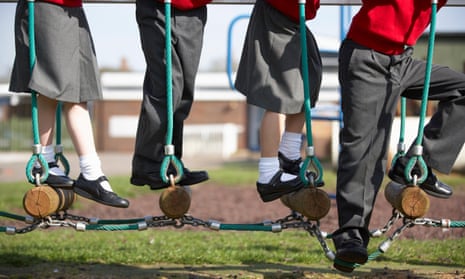A report by the National Audit Office has said schools face cuts of 8% in real terms by 2019-20. While the government said school funding would be ringfenced, headteachers are facing a mountain of increased costs: higher contributions to national insurance and teachers’ pensions, the introduction of the “national living wage”, pay rises and the apprenticeship levy. There’s no extra money for these, nor is funding per pupil rising in line with inflation. The NAO warned that cuts could put students’ “educational outcomes at risk”. To make matters worse, the education services grant, worth £600m, is also being cut, which means there will be less money for local authorities or academies to provide services such as school improvement.
Meanwhile, headteachers are nervously keeping an eye on proposals for a new funding formula for schools in 2018-19, expected to redistribute money from inner-city schools to rural areas. But even schools that are likely to gain under this model say any extra cash will be eaten up by increased costs.
‘We’ve cut our counsellor’s hours despite suicide attempts’
Everything has been cut. We used to spend lots of money on speech therapy, especially in primary, but the number of hours has been cut. Our gangs worker has gone, our drugs worker has gone. These were important people in our area, where students need this support.
Our counsellor has had her hours cut. I have a number of students on suicide risk assessments because they have attempted suicide, either at home or at school. For those children, part of their risk assessment is that they see the therapist. Apart from one, who has become a school phobic, they’re all in and attending and mostly succeeding. I think you can attribute that to the therapy. My concern is that there’s a fairly big waiting list of kids who haven’t tried to kill themselves and I can’t get them into therapy, because we haven’t got enough capacity. There’s absolutely no help outside of school.
The only thing we haven’t cut is the classroom teachers, but staffing has become leaner. We’ve lost teaching assistants, admin staff, senior leaders and this has included redundancies. If a teaching assistant leaves, we replace them with someone cheaper – fewer hours or less responsibility. In the past three years we’ve lost 25 people.
At Christmas time, we used to get theatre companies in to do pantomimes, because a lot of our children’s families just don’t do that sort of thing. It would cost £350 and normally we’d ask for contributions from parents - we’d get £100 in and then we’d top it up. We can’t top it up any more. This year it didn’t happen.
The gap between my kids and some of the other schools in the area is widening at a frightening rate. Parents elsewhere are stepping up and paying for things. But in my school I’ve got more than one family per year group where this Christmas the kids didn’t get any presents and they sat in their bedrooms eating sandwiches. I can’t fix that, but I can try to make coming to school as much fun as possible. Headteacher, west of England

‘I’m running nine-year-old computers’
I’ve got my training budget for staff down to £10,000 – I have 178 staff and the guidance says it should be around £70,000-£80,000. At a time when the government has changed every course, every exam curriculum, I’m struggling to cope with training my staff and I can’t afford to resource these courses.
I have 32 A-levels for my sixth formers at the moment, and I’m putting them into three categories: A-levels I’ll deliver myself, A-levels I’m going to have to find a different way of delivering, and A-levels I will never offer again. Some A-levels, such as music and languages, I may have to run jointly with other schools. I can’t afford my own special needs coordinator [who makes sure pupils with disabilities or special needs get the right support], so I share one with another school. I’m a school of 1,500 and the other school has 1,100 students. I’ve restructured everything. Over the last few years I’ve taken 13.2 full-time equivalent teaching staff out of the system through redundancy and non-replacement of staff. This includes two members of the senior leadership team. I don’t put any money into computers, I’m running nine-year-old computers.
There’s not a morose feeling in my school because it’s a bloody good school and people want to stay. But if I were in a different school, with a different demographic, it would be catastrophic.
As a local authority area, we are the sixth worst-funded schools in the country. A lot of us have been holding out for the national funding formula to save us. But Cheshire East will become officially the 150th in the list of 150 local authorities under the new funding formula. We’ll go from sixth worst to the worst. I can’t cut back any more. David Waugh, Poynton High School, Poynton, Cheshire

‘We can’t offer computer science as we can’t afford a teacher’
Over the last three years we’ve adopted a policy of not replacing staff where we don’t have to, and last year we ended up making four people redundant. It was the most brutal thing I’ve ever had to do, it was just horrible.
If you’re in education and you’re working with children you want staff who are happy and pulling together – try doing that and also saying “some of you are losing your jobs”. It has a massive effect on the children. We rely so much on our teachers; we’re an outstanding school and do loads and loads of wider curricular activities. Staff do that without charge, through goodwill. They’re not going to keep doing things like that if morale isn’t high.
We’ve had to look at our curriculum offer and say “well we can’t offer computer science to this year group because we can’t replace that member of staff”.
With these new courses coming out across A-levels and GCSE, staff are coming to me and saying “I want £2,500 to buy a new set of textbooks”. I say “no, I can’t afford them, find another way to do it”. With everything, you’re just trying to find ways of penny pinching. If something in the building breaks we won’t fix it unless we have to.
We’ve been told there’s no more money in the pot. One of the things I find galling is that when the prime minister decides she has a policy she wants to announce, like let’s have more grammar schools, they suddenly find millions to set up new grammar schools.
Education is at a tipping point – I really do think if we do not sort out the funding problem and the recruitment crisis, then within two to three years the whole system could implode. Fantastic, dedicated classroom practitioners will just turn around and say: I’m not going to carry on doing this job any more, not for this money, not for this workload, not with this amount of stress. Sean Maher, Richard Challoner school, New Malden, Greater London
‘No wonder teachers are leaving, they’ve had enough’
We are running on a skeleton staff. We have some classes of 34; we went up to 35 at one point because we couldn’t afford to open a new class.
We have a boy in a wheelchair who needs one-to-one support but he’s not funded for one-to-one, so I’m pulling staff from other classes who should be supporting other children. We haven’t got enough staff.
You end up with a teacher with 34 children in a class, with many with special needs and medical problems, and you don’t get medical support [which used to pay for a member of staff to be specially trained] any more. We have a child with diabetes who keeps passing out; we don’t get any medical funding to support her. No wonder teachers are leaving; they’ve had enough.
Over the last two to three years I’ve been really prudent with the budget, but next year we’ll start going into deficit.
We don’t use teachers for supply any more; we use higher level teaching assistants. We used to have a capital budget [which pays for improvements to the school premises] that was quite large; now it’s £6,000. I’ve had to apply to the local authority to have my roof replaced and I’ve got to provide the first £15,000. I’ve got to find the money somehow. That means next year I won’t be able to spend anything on my curriculum budgets – literacy resources, numeracy resources, IT spending and so on.
Some schools have a dedicated family liaison person, but none of the schools in Cambridgeshire does because we just can’t afford it. I’m sitting here counselling the same parents week on week, having massive arguments with them about attendance, because I’m going to be judged on attendance. I’m constantly referring cases to social services – who say it doesn’t meet the threshold. Primary head, Cambridgeshire

‘I worry about asking parents for money’
In Brighton we’ve got a peculiar situation where in the city centre, schools – the more middle-class schools – are full, but on the outskirts our funding problem is that we’re not full. I’ve got 100 or so places that I can’t fill. You get £3,000 per child, so you’re looking at £300,000 I’m already down on my budget before you’re even thinking about funding cuts.
We’re only not in deficit because I have a good business manager and we’re spending absolutely no money. We don’t hire supply teachers, we have one person who is in-house supply. If anybody is off sick we tend to split classes or use learning mentors to cover because we can’t afford supply teachers. Heaven forbid if anybody goes long-term sick leave because that would tip the budget into the red. It’s a massive worry.
I’m spending a lot of time thinking creatively about how to make money. We are having to make ourselves into marketable commodities – we’re thinking all the time about how to creatively raise funds, divert funds or not spend funds. Our PTA and fundraising events are funding our equipment. All the computers are funded through the PTA.
At Christmas, the children all made decorations in class and sold them to parents. We filmed the school play ourselves, spent the weekend burning many, many DVDs, sold them cheaply to parents, and we made £600 from things like that. That went to pay for resources to use in lessons. You worry about the fact that, for example, we charge parents £1 a ticket to come and watch the children’s play.
It’s come to the point that you’re having a conversation with teachers about whether they can afford to buy a set of Pritt Sticks before the end of the financial year – that’s quite ridiculous. Helen Longton Howorth, Carden primary, Brighton











Comments (…)
Sign in or create your Guardian account to join the discussion